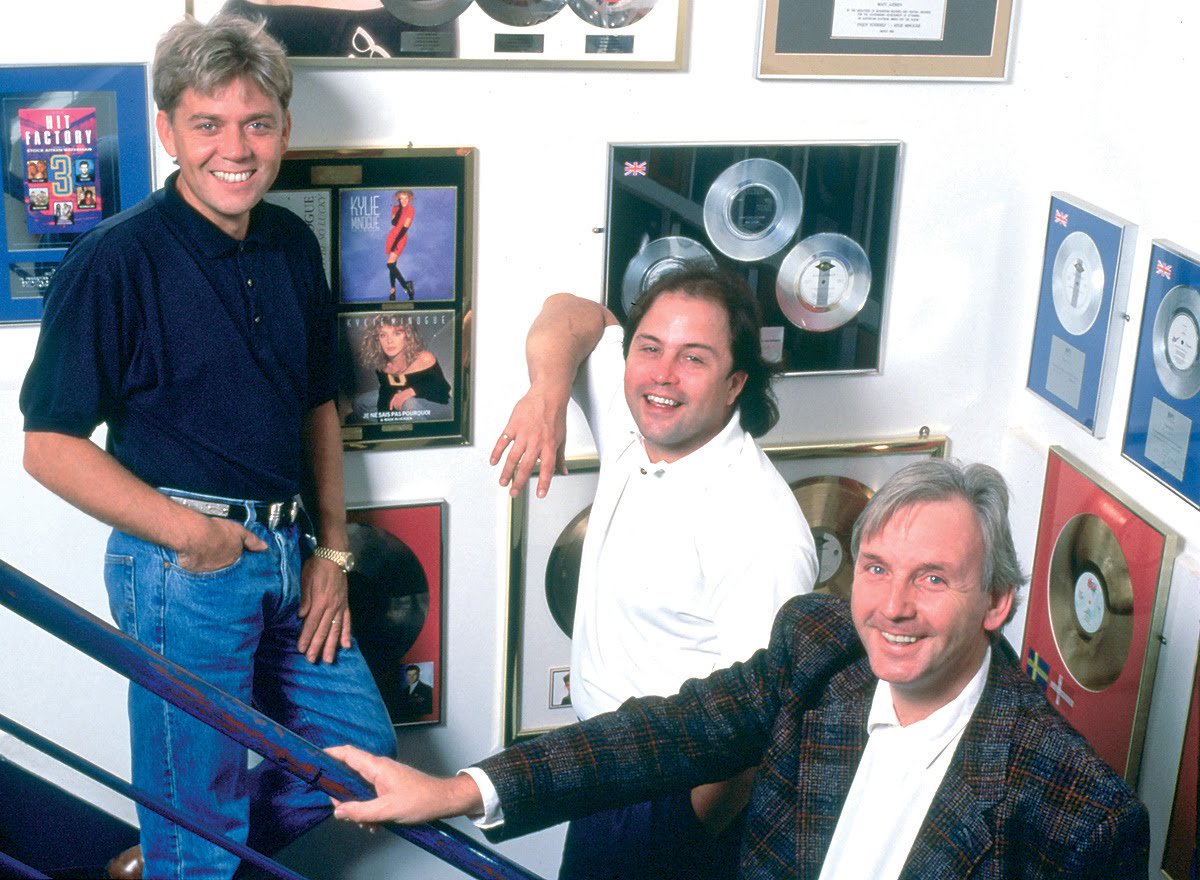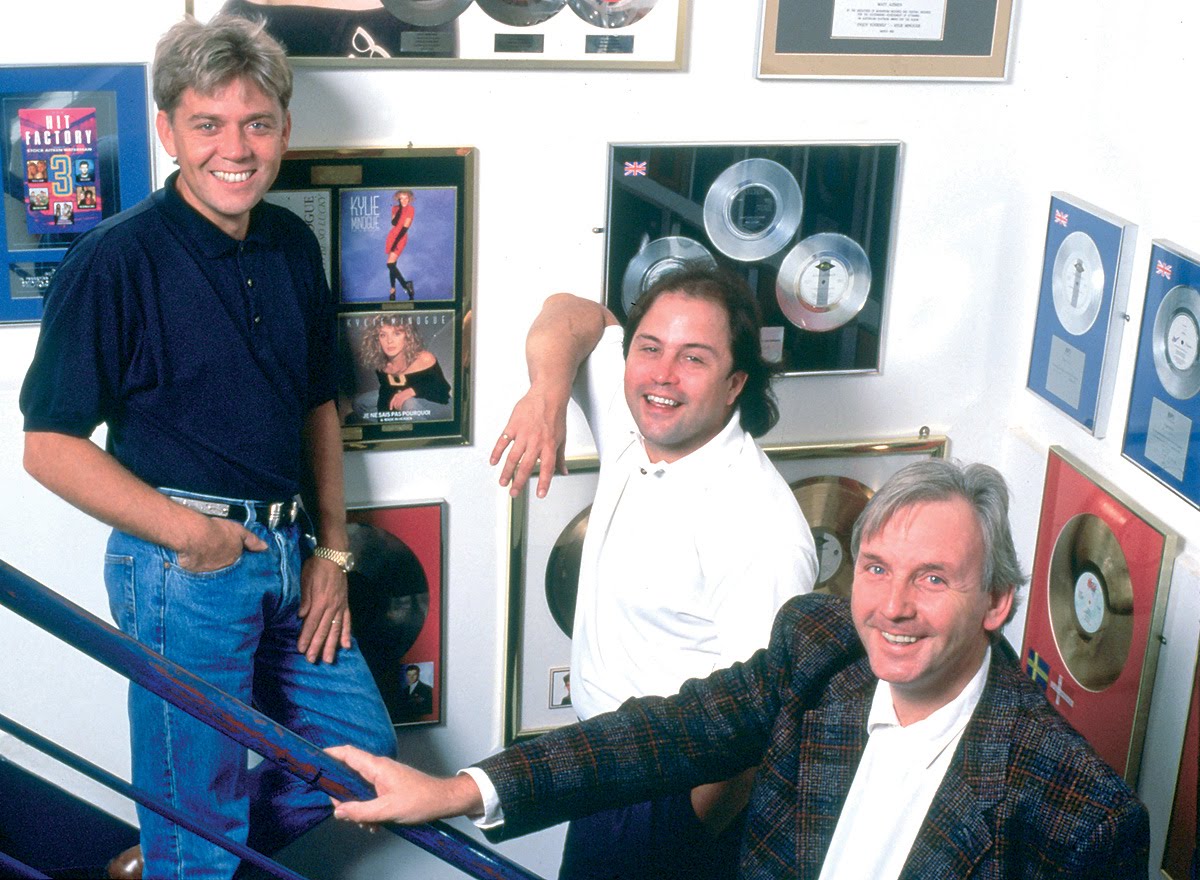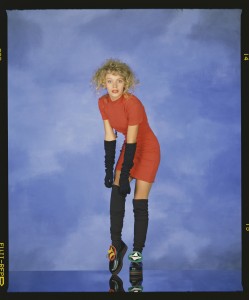Stock Aitken Waterman: The biggest hitmakers of the 80s

In the 27 years since Kylie Minogue released I Should Be So Lucky, she has performed the track in a myriad of styles, from torch song to techno rave-up to reciting the lyrics at the Poetry Olympics (in trackie bottoms and trainers with a face scrubbed free of make-up, no less). However, it is the moment she climbed into a bubble bath to recreate the now iconic scene from the song’s video on her Kiss Me Once tour that will go down as the definitive live rendition of the song. Remaining faithful to the original version, the performance was an unabashed love letter to Kylie’s apprenticeship at Stock Aitken Waterman’s Hit Factory, where, under the guidance of the chart-topping triumvirate, she was veered to becoming the pop icon we know and love today.
To mark the 30th anniversary of the Hit Factory, Kylie’s four Stock Aitken Waterman-produced albums have been given the deluxe edition treatment, digitally remastered and packed with remixes, B-sides and videos.
“These really are the definitive versions of the Kylie albums,” says Pete Waterman. “Everything we did with Kylie is on these reissues, there is nothing else left. We don’t have any unreleased demos of any artist because we never did them – that isn’t how we worked. We wrote the song specifically for them, recorded it, then put it out. We didn’t have time to write songs we weren’t going to use.”
As well as the wealth of material contained on the CDs, the reissues feature bonus DVDs featuring scarce TV performances – the ultimate souvenir of the retro-Kylie experience and, says Pete, an integral part of the Stock Aitken Waterman phenomenon.

“Those performances were hugely important to our success,” says Pete. “That was how people found out about the songs – they heard them on the radio or saw them on Top Of The Pops or the Saturday morning TV shows, then went out and bought the record. The music industry today is vastly different to what it was then. There was no social media – those shows were like the Twitter of their day.”
The Stock Aitken Waterman story began in 1984 when Mike Stock and Matt Aitken, a pair of songwriters/musicians who had been touring the working men’s club scene for years, approached Pete Waterman, a DJ/producer who had recently enjoyed success with acts including Musical Youth and Nik Kershaw, to form a writing/production company which would provide songs to a roster of artists. Their business model was loosely based on the legendary Tamla Motown record label of the 1960s. Waterman loved the idea and started to seek out talent to write and produce for.
Inspired by the music that Pete was playing in the underground gay clubs, the trio decided that Hi-NRG would form the basis for their sound. After the flop of the first Stock Aitken Waterman releases, they explored gay subculture further, teaming up with Divine for You Think You’re A Man, which became their first Top 20 hit. Along with Frankie Goes To Hollywood’s seminal anthem, Relax, the song helped to propel the sound of the underground to the top of the charts. They followed Divine with Hazell Dean’s Whatever I Do (Wherever I Go), which became the first song written and produced by Stock Aitken Waterman to hit the Top 10 and established their trademark sound.
“Most examples of Hi-NRG were short on song,” recalls Mike Stock. “I was keen to bring structured songs into the style. We saw the club scene as a genuine way to reach people who might buy records.We took forward some of the dance elements into the more poppy projects. After Hazell Dean’s song, Dead Or Alive approached us and were really keen to work with us.
“The elements from Hi-NRG that we put into Hazell’s tracks and how we incorporated them into a full-on pop song were what Pete Burns loved. He was keen to do a similar thing.”
Dead Or Alive had been working on their second album when Pete Burns heard the Stock Aitken Waterman tracks and decided they were the logical sound choice for the “glittery disco record” he had in mind. He presented them with a demo tape containing four tracks, one of which was the now-infamous You Spin Me Round (Like A Record).
“As soon as I heard the demo I knew it was a No.1 hit,” says Pete Waterman. “There was a magic about it. We had been fighting to make a living and make a name for ourselves
and Pete Burns walked in with a piece of gold and asked us to shine it for him. Of course we were going to do it!”
The song was released in November 1984 and steadily climbed the charts before hitting No.1 in March 1985, kick-starting a cacophony of smash hits for Stock Aitken Waterman, with each usurping the success of its predecessor, and firmly establishing them as a pop powerhouse. The chart-dominating trio would go on to write and produce over 100 Top 40 singles and sell over 60 million records.
![70d9e54ff5106f294146c8c9dcc82197[1]](/wp-content/uploads/sites/5/2015/07/70d9e54ff5106f294146c8c9dcc821971_O2K7D5y.jpg)
“Just as had happened with Dead Or Alive, we were approached by Bananarama because they wanted elements from them.” says Mike. “That set the way forward for us. But I was keen not to be too repetitive and Princess, a soul singer, was our next hit. But dance orientation was always going to figure in our records.”
Having enjoyed a run of hits in the early 1980s, Bananarama were struggling to maintain their momentum and turned to Stock Aitken Waterman to revitalise their sound. “They were unsure of who they were when they came to us,” Mike recalls. “I had a strong directional sense for them. We got the first album past them without too much debate following the first couple of hits because we were able to point to our records as highly successful, so they couldn’t put up much argument.”
The huge success of Venus determined the direction Bananarama were to head in next. Deciding to work exclusively with Stock Aitken Waterman on their subsequent album, Wow!, the sessions were fraught, with the girls frustrated at the lack of control they were being afforded. They were also said to feel that Stock Aitken Waterman were spreading themselves too thinly, thanks to a burgeoning roster of new artists including Mel & Kim, Rick Astley, Sinitta and Samantha Fox.![sonia-album-cover1[1]](/wp-content/uploads/sites/5/2015/07/sonia-album-cover11.jpg)
By 1987, Stock Aitken Waterman had become an unstoppable force in pop music with their newly acquired Hit Factory Studios the epicentre of Planet Pop. They had developed a sound unique to them – outwardly happy music with songs often addressing doomed relationships and unrequited love, which perfectly struck the balance between chart smash and club classic. The songs were particularly beloved by teen girls and gay men – an audience that has remained loyal to this day.
“I think it’s the story in the song the gay fanbase are drawn to, “ says Mike. “I never intend to just catch the gay market as that would be condescending. But the emotional attachment to tunes and storylines is far more powerful than a dance beat on its own. I can seriously be moved by songs, but I can only move my feet to a beat. We worked best when we combined beats, tunes and lyrics. It was, after all, our first principle. Structured songs with dance beats.”
“It was Techno Disco – that’s how we saw ourselves,” recalls Pete. “What we were basically doing was playing Motown songs on the latest technology. We realised that if we were serious about competing against Trevor Horn and all his brilliant records, we had to have the latest technology.”
Although almost everything they put their names to was a guaranteed hit, Pete was perplexed when labels refused to sign his next protégée, Kylie, on account of her coming from a TV soap.
“Every single label we went to passed on Kylie,” says Pete. “No one ever said anything bad about her or the song, it was the fact she was a TV star. Everybody said you couldn’t turn a TV star into a pop star. They flat-out refused.”

The snub was the catalyst for the creation of PWL Records, a label founded so they could sign and release any records they liked. I Should Be So Lucky was the label’s first release and the first of 19 Top 20 hit singles and four Top 10 albums, making her the Hit Factory’s most successful export.
What is obvious from the reissue of Kylie’s first four albums is how big the leap was, both musically and stylistically between Enjoy Yourself and Rhythm Of Love. Though it has been claimed this was the result of Kylie’s relationship with Michael Hutchence –and certainly style-wise she had transformed herself from Barbie to Barbarella – Mike is keen to dispel the myth that her private life was dictating her output.
“The story that Better The Devil You Know was a direct result of Kylie’s awakened sexuality with Hutchence is nonsense,” laughs Mike. “Matt Aitken and I had Kylie’s transformation all planned. We knew we had to grow her up. We went from I Should Be So Lucky to Shocked and Better The Devil You Know in about 18 months. We knew nothing of her relationship with Michael, and Kylie did not attempt to steer the direction of our output.”
Buoyed by Kylie’s success and revelling in the chance to silence their naysayers, Stock Aitken Waterman repeated their soap star-to-pop star transformation with Jason Donovan. With the UK gripped by Neighbours-mania – Kylie and Jason’s characters, Charlene and Scott’s wedding was watched by 21 million viewers – Stock Aitken Waterman were inundated with orders for the Kylie & Jason Christmas duet, despite the fact no such thing had been planned. When store orders exceeded 600,000 copies, they succumbed to public pressure and wrote and recorded Especially For You in time for Christmas 1988. The song went on to sell over one million copies and catapulted Jason onto the bedroom walls of teenage girls and sexually confused boys across the UK.
Although the success of Kylie and Jason had become the biggest thing to hit Stock Aitken Waterman, PWL’s decision to capitalise on the pre-teen market cost them their credibility. By 1989, they were criticised for their production-line approach to pop music. Taking everyday people and making them overnight sensations was frowned upon and a vitriolic backlash ensued.
“It became so predictable,” says Mike. “The music press would hate all our records, but the public still bought them! Sometimes it verged on the hysterical. From our perspective, the songs had passion and belief, but we were slowly being marginalised by an industry which was dismantling itself. In so doing it dismantled the connection the public had with real pop music.”
Despite the criticisms leveled at them, Stock Aitken Waterman’s success continued throughout 1989 – their most successful year. As well as new acts such as Sonia and Big Fun and established acts such as Cliff Richard and Donna Summer turned to the trio to revitalise their careers.
As the 1990s dawned and music tastes changed with the advent of grunge and hip-hop, Stock Aitken Waterman’s popularity took a major dip. With the exception of Kylie, their songs were no longer the smash hits they had once been. The pressure of maintaining an eight-year stronghold at the top of the charts took its toll and Stock Aitken Waterman split.
Following the disbandment of Britain’s most successful songwriting/production team of all time, they all remain active in the music industry. Pete went on to enjoy great success with Steps, while Mike produced hits for Scooch and Robson & Jerome. Although it is 30 years since the Hit Factory opened for business, they remain as passionate about music as they ever have.
Mike has recently worked with Attitude favourite Shayne Ward on his comeback album. “It was a dream for me,” he says. “Shayne is great to work with. The more talented the singer, the easier they are to work with. He’s focused and delivers the song. What more could I want?”
Words by MARK LINDORES
Kylie’s four PWL albums are out now from Cherry Red Records. The live show A Life In Song: Pete Waterman is on July 29 at the Southbank Centre.
This feature originally appears in the summer 2015 issue of Attitude – you can still download the full issue from Pocketmags.com/Attitude.
